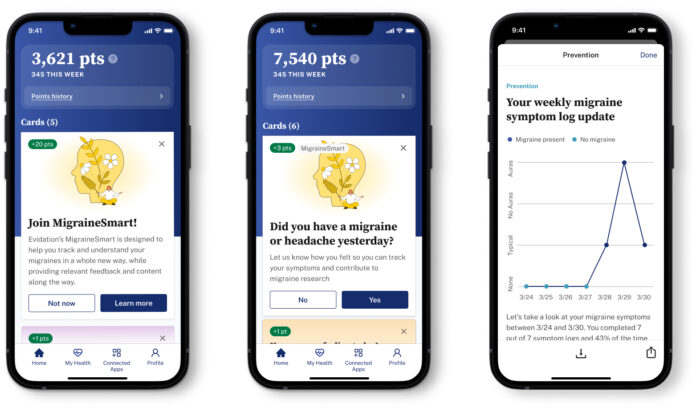SAN MATEO, Calif.– Today, Evidation, the company creating new ways to measure and improve health in everyday life, is announcing MigraineSmart, a health engagement program on the Evidation app that helps individuals track and better understand their migraine symptoms.
Migraine is a chronic, disabling, and heterogeneous condition that is estimated to affect over 40 million Americans nationwide and disproportionately affects women1. Migraines can have a severe impact on quality of life, including on an individual’s physical and mental health, ability to work, and relationships. An interplay of genetic and environmental factors, including specific near-term triggers, are implicated in causing migraine. While there is a plethora of treatment options, many migraine sufferers in the United States do not receive adequate treatment.2
MigraineSmart is a health engagement experience and symptom tracking program on the Evidation app that harnesses survey data, electronic patient reported outcomes (ePROs), wearable data, and evidence-based content to make it possible for individuals to better understand and manage their migraines.
MigraineSmart includes:
- Personalized insights: MigraineSmart delivers weekly insights and a monthly report aligning symptom logs with wearable data, so participants can quickly see the relationship between their symptoms and daily activities.
- Rewards for engagement: Individuals earn points redeemable for cash or charity for logging symptoms and for engaging with educational content and insights.
- Opt-in research opportunities: Participants can opt-in to sharing additional health data, including claims data and electronic health records, with researchers. Researchers can permission data from MigraineSmart to better understand the lived experience of individuals with migraine outside of clinical settings.
“Migraine experiences vary widely across individuals. Harnessing everyday health data holds tremendous promise for advancing deeper understanding of this condition,” said Meg Dryer, General Manager, Consumer. “Our goal is to generate new disease models that will contribute to a deeper, real-world understanding of this condition that can make a difference for patients.”
An initial pilot of 3,492 participants in the MigraineSmart program found:
- 43% of participants reported taking a prescribed medication to manage symptoms, with triptans being the most common type of prescription medication reported.
- Participants, on average, logged 50% less steps on migraine days, compared to days without migraines.
- Over 50% of participants reported sharing or planning to share their monthly MigraineSmart report with their healthcare providers.
Evidation has been conducting longitudinal, direct-to-participant research on the impact of migraines on everyday life since 2018. Earlier this year, Evidation conducted a survey of 21,702 individuals with migraine and found that 41% did not see any healthcare provider for their symptoms in the past year. The survey also found that younger individuals aged 18-44 were significantly less likely to use prescription medications, even though those individuals are more likely to face increased burden of disease.
“The lived experience of migraine sufferers is not sufficiently characterized with claims or clinical data. MigraineSmart makes it possible to generate high resolution, research-grade data and insights on migraine that is actionable for patients and relevant for health researchers,” said Abigail Levine, PhD, Senior Director of Product Strategy at Evidation.
Since its founding over a decade ago, Evidation has worked to characterize and measure the impact of conditions across therapeutic areas to better understand disease onset and progression, treatment impact, disease management experiences, quality of life, and social determinants of health across diverse populations, longitudinally.


